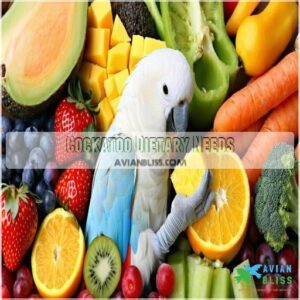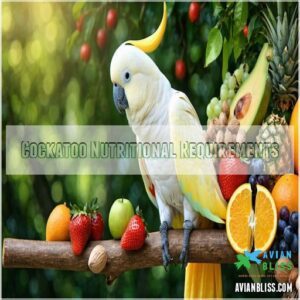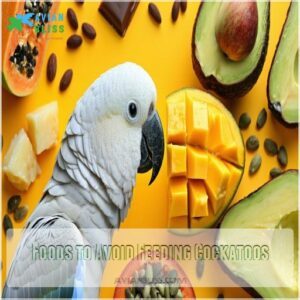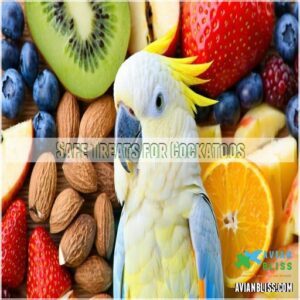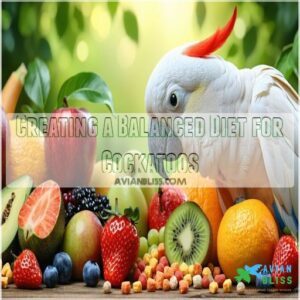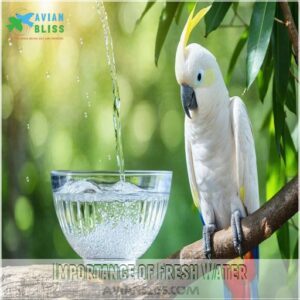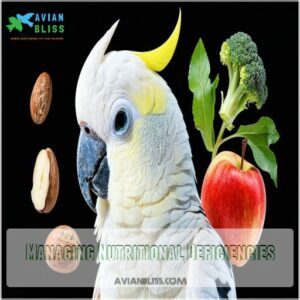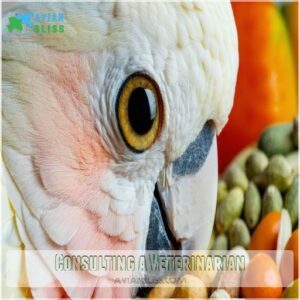This site is supported by our readers. We may earn a commission, at no cost to you, if you purchase through links.

You’ll want to stick with trusted brands like Kaytee Fiesta or Lafeber Nutri-Berries for the base diet.
Safe treats, such as unsalted nuts, apple slices (minus the seeds), and berries, should only make up 10-20% of their daily food intake.
Watch out for toxic foods like avocados, chocolate, and onions.
Finding the perfect balance of safe bird food for cockatoos isn’t rocket science, but there’s more to it than meets the eye.
Table Of Contents
- Key Takeaways
- Cockatoo Dietary Needs
- Best Foods for Cockatoos
- Cockatoo Nutritional Requirements
- Foods to Avoid Feeding Cockatoos
- Safe Treats for Cockatoos
- Creating a Balanced Diet for Cockatoos
- Foraging and Feeding Behaviors
- Importance of Fresh Water
- Managing Nutritional Deficiencies
- Consulting a Veterinarian
- Frequently Asked Questions (FAQs)
- What is the best food to feed a cockatoo?
- What do white cockatoos like to eat?
- Can cockatoos eat raw eggs?
- What should you not do with a cockatoo?
- How often should I switch up my cockatoos food?
- Can cockatoos eat food straight from the fridge?
- Do wild and captive cockatoos need different diets?
- Should cockatoo food portions change with the seasons?
- What time of day is best to feed cockatoos?
- Conclusion
Key Takeaways
- You’ll need to feed your cockatoo a balanced diet consisting of 70% high-quality pellets, 20% fresh fruits and vegetables, and 10% treats like unsalted nuts and seeds.
- You should avoid toxic foods, including avocados, chocolate, onions, and apple seeds, as these can cause serious health issues or death in cockatoos.
- You’ll want to create multiple feeding stations and use foraging toys to encourage natural behavior, keeping your cockatoo mentally stimulated during mealtimes.
- You must replace your cockatoo’s water at least twice daily, using stainless steel or ceramic bowls to prevent water-borne illnesses and maintain proper hydration.
Cockatoo Dietary Needs
You’ll need to feed your cockatoo a balanced mix of protein-rich pellets, fresh fruits, and vegetables to keep them healthy and happy, just like you’d plan your own nutritious meals.
While your feathered friend might prefer snacking on sunflower seeds all day, it’s up to you to guarantee they’re getting the right nutrients.
at least 12% protein and plenty of essential vitamins.
Essential Nutrients for Cockatoos
Your cockatoo’s health hinges on getting the right nutrients, just like a finely-tuned engine needs the proper fuel.
Essential protein needs range from 12-14%, while fat sources should make up 5-12% of their diet.
They’ll thrive with a balanced mix of vitamins A, B, C, D, and K, plus important minerals like calcium, which can be found in high-quality cockatoo food pellets cockatoo nutrition pellets.
Don’t forget dietary fiber – it’s key for healthy digestion in your feathered friend’s cockatoo nutrition plan.
Importance of Balanced Parrot Diet
Now that you understand the nutrients your cockatoo needs, let’s talk about making their meals exciting and balanced.
Building a proper cockatoo diet is like creating a perfect playlist – it needs variety to keep things interesting!
Here are four ways to nail your bird’s nutrition:
- Mix up pellets with fresh goodies daily
- Keep treats under 30% of total food
- Follow the 70-30 rule (pellets to fresh foods)
- Watch portion sizes to maintain healthy weight
Hydration and Its Role in Cockatoo Health
Keeping your cockatoo’s water intake balanced is necessary for their overall wellness and feather quality.
Think of hydration as the foundation of bird health – it affects everything from kidney function to digestion.
Here’s a quick guide to ideal hydration for your feathered friend:
| Sign | Hydration Status | Action Needed |
|---|---|---|
| Bright, Alert Eyes | Well-hydrated | Continue current routine |
| Flaky Skin | Mild dehydration | Increase fresh water access |
| Sunken Eyes | Moderate dehydration | Contact vet immediately |
| Dry, Wrinkled Feet | Severe dehydration | Emergency vet visit |
| Thick Saliva | Critical dehydration | Immediate medical care |
Best Foods for Cockatoos
You’ll find the perfect blend of nutrition and taste in our top picks for cockatoo foods, from trusted brands like Kaytee Fiesta and Lafeber Nutri-Berries that your feathered friend will love.
Whether you’re looking for pellets, seeds, or fruit blends, you’ll find plenty of options that’ll keep your cockatoo healthy and happy without breaking the bank.
1. Kaytee Fiesta Parrot Food 25lb Bag
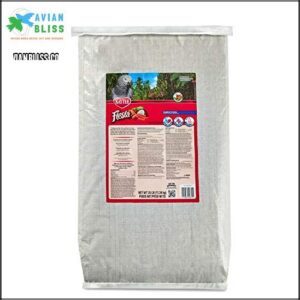
Regarding trusted parrot food brands, Kaytee Fiesta stands out with its nutritionally fortified blend.
This veterinarian-recommended formula packs a healthy punch with Omega-3s for brain health, antioxidants for immunity, and prebiotics for digestion.
You’ll find a colorful mix of fruits, nuts, and veggies that’ll keep your cockatoo engaged during mealtime.
With its emphasis on locally produced options and minimal artificial ingredients, Kaytee Fiesta aligns with the principles of choosing top rated parrot food.
While some owners note the high sunflower seed content, mixing it with other foods creates an ideal balance.
The 25lb bag offers good value, though watch for occasional quality variations in different batches.
Best For: Parrot owners seeking a nutritionally complete, veterinarian-recommended food with a variety of fruits, nuts, and vegetables.
- Nutritionally fortified with Omega-3s, antioxidants, and prebiotics.
- Veterinarian-recommended formula.
- Contains a variety of appealing ingredients.
- High sunflower seed content may be messy and cause concern for some owners.
- Occasional quality control issues reported.
- Price fluctuations and lack of bulk discounts noted.
2. Lafeber Nutri Berries Macaw Cockatoo Food
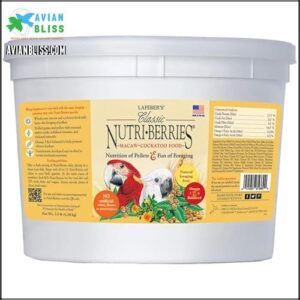
Lafeber Nutri-Berries are a top choice for cockatoo nutrition, featuring vet-formulated, non-GMO ingredients.
These berry-shaped treats promote natural foraging and deliver complete nutrition; they’re like nature’s puzzle toys.
Made with human-grade ingredients, they are free from artificial colors and preservatives, packing essential nutrients with 12.5% protein and 8% fat.
While pricier than standard pellets, their dual benefit of entertainment and nutrition makes them worthwhile, especially for picky eaters who give them rave reviews.
Best For: Macaws and cockatoos, especially picky eaters, who need a nutritionally complete and engaging food.
- Promotes natural foraging behavior and beak exercise.
- Made with non-GMO, human-grade ingredients, free of artificial additives.
- Highly palatable and preferred by many birds, reducing food waste.
- More expensive than standard pellets.
- Large tubs may lead to spoilage if not used quickly.
- Spicy variety is available but costly.
3. Roudybush Bird Food Medium 10 Pound Bag
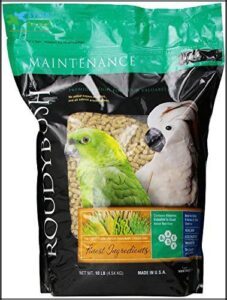
Roudybush Medium Pellets pack a nutritional punch for your feathered friend. USA-made formula’s clean ingredient list is free from added sugars, artificial colors, and animal by-products.
The steam-pelleted process locks in nutrients while keeping harmful bacteria at bay.
With 11% protein and 7% fat, it’s perfect for maintaining your cockatoo’s health.
While some birds might take time to adjust from seeds, customers report improved liver enzyme levels and overall health.
Just remember to store it properly – freezing helps prevent flour moth issues.
Best For: Medium and small parrots of various species, needing a nutritious, low-fat, and scientifically formulated diet.
- Nutrient-rich formula improves overall health and may improve liver enzyme levels.
- Made in the USA with a clean ingredient list, free of added sugars, colors, and animal by-products.
- Steam-pelleting process preserves nutrients and eliminates harmful bacteria.
- Some birds may need a transition period to adjust from seed-based diets.
- Potential for flour moth infestation if not stored properly (freezing recommended).
- Pellets may be dropped into water bowls, leading to fermentation and odor.
4. ZuPreem Pure Fun Large Bird Food
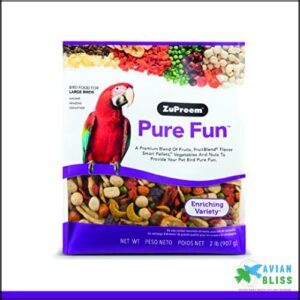
Packed with a vibrant mix of fruits, pellets, and seeds, ZuPreem Pure Fun offers your cockatoo an exciting mealtime experience.
You’ll find natural ingredients like dried bananas, pistachios, and carrots, alongside essential vitamins and minerals.
It’s designed to make up 30% of your bird’s weekly diet, complementing their regular food while encouraging playful interaction.
Bird owners report fewer feather-plucking issues and improved overall health with this blend.
While it’s pricier than basic seed mixes, the quality ingredients and your cockatoo’s obvious enjoyment make it worth considering.
Best For: Large parrots like Amazons, Macaws, and Cockatoos of all life stages who enjoy a varied diet.
- Encourages playful interaction during mealtimes.
- Contains a blend of high-quality fruits, vegetables, seeds, and pellets.
- Many users report improved bird health and reduced feather plucking.
- Can be more expensive than basic seed mixes.
- Some users have reported receiving incorrect order sizes.
- Contains artificial colors.
5. Lafebers Classic Avi Cakes Bird Food
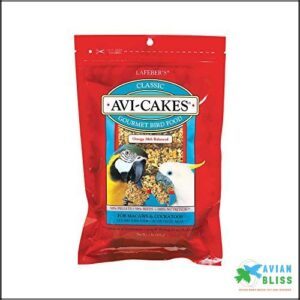
You’ll love watching your cockatoo go wild for Lafeber’s Classic Avi-Cakes.
These vet-formulated treats combine the best of both worlds – seeds and pellets – encouraging natural foraging behavior while providing complete nutrition.
Made with non-GMO, human-grade ingredients and free from artificial additives, they’re perfect for picky eaters.
The square shape offers excellent beak exercise, and the antioxidant-rich formula supports healthy feathers and immune function.
While they’re pricier than standard pellets, the quality and your bird’s excitement make them worth every penny.
Best For: Adult macaws and cockatoos who need a nutritionally complete, foraging-based food.
- Encourages natural foraging behavior.
- Supports healthy skin, feathers, and immune system.
- Made with non-GMO, human-grade ingredients.
- Can be expensive compared to standard pellets.
- Prone to damage during shipping.
- Availability can be an issue in some areas.
6. Bird Street Bistro Parrot Food Sampler
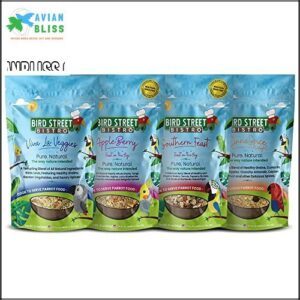
Bird Street Bistro’s Parrot Food Sampler brings a gourmet touch to your cockatoo’s meal time.
With four unique flavors including Viva La Veggies and Apple Berry, this 100% natural blend features freeze-dried fruits, organic grains, and air-dried vegetables.
Ready in just 3 minutes, it’s perfect for busy bird parents.
While some cockatoos might need time to adjust, many owners report improved health and weight in their feathered friends.
At 3.18 pounds, it’s worth trying the sampler first to see if your picky eater approves.
Best For: Medium to large birds, including parrots, parakeets, cockatiels, macaws, and African greys, although some birds may not be interested.
- 100% natural recipe with no fillers, sugars, or sulfites.
- Ready in 3 minutes; convenient for busy owners.
- Many positive reviews regarding improved bird health and weight.
- Some birds, such as cockatoos, may not be interested.
- The multi-pack might be wasteful for owners who don’t feed fruit regularly.
- May be better suited for smaller birds; consider starting with a smaller pack.
7. Dr Harveys Exotic Parrot Seedless Blend
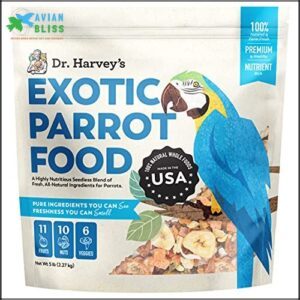
Inside the colorful blend of Dr. Harvey’s Exotic Parrot Seedless mix, you’ll find a treasure trove of fruits, nuts, and veggies that’ll make your cockatoo’s beak water.
Ultra-premium ingredients like mangos, macadamia nuts, and fresh bell peppers offer excellent foraging opportunities.
While it’s pricier than some options, most birds love this USA-made blend.
Just keep an eye out – some batches might contain hidden sugars in items like banana chips.
If your feathered friend’s picky, you might want to start with a smaller bag first.
Best For: Large parrots who enjoy a varied diet of fruits, nuts, and vegetables.
- Premium ingredients for optimal health and vibrant plumage.
- Mimics natural foraging, keeping birds entertained and stimulated.
- Made in the USA with no artificial colors, dyes, or preservatives.
- Pricey compared to other parrot food options.
- Inconsistent reports on parrot acceptance; some birds may not enjoy it.
- Potential for unlisted added sugars and artificial coloring in some batches.
Cockatoo Nutritional Requirements
You’ll need to make sure your feathered friend gets the right mix of protein, fats, and vitamins to stay healthy and happy, just like how we humans need a balanced diet to thrive.
While your cockatoo’s specific needs may vary, you can’t go wrong with a diet that includes at least 12% protein, plenty of fresh fruits and veggies, and foods that are free from artificial colors and added sugars.
a balanced diet, feathered friend, cockatoo’s specific needs
Protein Requirements for Cockatoos
Now that you’ve got a good grasp on the best commercial foods, let’s talk protein – the building block of your cockatoo’s health. Getting the right amount is like walking a tightrope; too little leaves them weak, too much can harm their kidneys. You can find a variety of cockatoo pellet food options at cockatoo pellet food to help meet their protein needs.
- The minimum protein requirement is 12% of their daily diet
- Seeds alone won’t cut it – they need varied protein sources
- Legumes and nuts provide excellent plant-based protein
- Commercial pellets offer balanced protein levels
- Fresh foods should complement, not replace, protein-rich pellets
Fat and Vitamin Content in Cockatoo Foods
The fat content in your cockatoo’s diet should range from 5-12% from plant-based sources.
For instance, understanding essential vitamins for bird health is important in providing a well-rounded diet.
Your feathered friend needs essential vitamins like A, B, C, D, and K, along with calcium for ideal health.
Quality commercial foods like Roudybush provide these nutrients in balanced amounts, but you can boost vitamin intake through fresh foods.
Just remember, your cockatoo’s nutritional needs vary based on age and activity level.
Avoiding Foods With Added Sugar and Artificial Colors
While many commercial bird foods catch your eye with bright colors, those artificial dyes and added sugars aren’t doing your cockatoo any favors.
You’ll want to focus on natural food choices that skip these unnecessary additives.
Take a close look at ingredient labels – if you spot artificial colors or added sweeteners, it’s best to explore healthy alternatives like Roudybush or Lafeber’s Nutri-Berries for your feathered friend.
Foods to Avoid Feeding Cockatoos
While your cockatoo’s curious beak might lead them to nibble on everything in sight, you’ll need to watch out for foods that can harm your feathered friend.
from everyday items like avocados and chocolate to seemingly innocent treats like apple seeds.
Just as you’d childproof your home for a toddler, you’ll want to keep these dangerous foods far from your cockatoo’s reach to guarantee they stay happy and healthy.
Toxic Foods for Cockatoos
For your cockatoo’s safety, you’ll need to steer clear of several toxic foods that could spell trouble. Think of these items as your bird’s kryptonite – they’re absolute no-gos in any cockatoo diet:
- Avocados contain persin, which can cause heart failure
- Chocolate and caffeine are toxic to their nervous system
- Onions can trigger dangerous anemia
- Apple seeds and cherry pits release harmful cyanide compounds
Let’s keep your feathered friend safe by avoiding these dangerous items!
Foods With High Sugar and Fat Content
Beyond toxic foods, you’ll want to watch out for items high in sugar and fat that can harm your cockatoo’s health.
Just like us, these smart birds can get hooked on sweet and fatty treats, leading to obesity and health issues.
For example, foods like nuts can be fine in moderation, as seen in the parakeet’s diet which notes that nuts like almonds and pistachios are suitable treats in moderation due to their high-fat content like safe foods for parakeets.
| Food Type | Sugar Impact | Fat Dangers | Healthy Alternatives |
|---|---|---|---|
| Dried Fruits | High sugar spikes | Moderate | Fresh berries |
| Chips/Crisps | Hidden sugars | Excessive fats | Raw vegetables |
| Chocolate | Dangerous levels | High fat content | Unsalted nuts |
| Processed Seeds | Added sugars | Unhealthy oils | Natural seeds |
Foods With Low Nutritional Value
Just like you wouldn’t thrive on a diet of potato chips, your cockatoo needs more than empty calories.
Skip the lettuce and cucumber – they’re mostly water with little nutritional value. These low-value foods can lead to nutritional deficiencies if they make up too much of your bird’s diet.
Instead, choose healthy alternatives like leafy greens, colorful vegetables, and safe cockatoo snacks packed with nutrients.
Safe Treats for Cockatoos
You’ll love watching your cockatoo’s eyes light up when you offer healthy treats like fresh blueberries, unsalted nuts, or crisp apple slices as rewards for good behavior.
While treats shouldn’t make up more than 10-20% of your bird’s daily diet, choosing the right ones can make training more effective and strengthen your bond with your feathered friend. This is important for training and bonding.
Fresh Fruits and Vegetables as Treats
While keeping toxic foods away from your cockatoo is key, let’s explore some tasty treats they’ll love.
You can find a variety of cockatoo safe fruits at online stores like cockatoo safe fruits.
Your feathered friend can safely enjoy fresh fruits like apples (minus the seeds), blueberries, and grapes in moderation. Mix in vegetables like leafy greens for added nutrition.
Remember to keep fruit treats to 10-20% of their daily diet for best health.
Nuts and Seeds as Healthy Treats
Nuts and seeds make fantastic treats for your cockatoo, but smart portion control is key.
Your feathered friend will love almonds, pistachios, and walnuts – just keep them unsalted!
A good cockatoo seed mix shouldn’t make up more than 25% of their diet.
When offering these healthy treats, remove any sharp shells and watch portion sizes to avoid weight gain.
Your bird’s snack time can be both fun and nutritious!
Whole Grains and Legumes as Treats
Your cockatoo will love the nutritional boost from whole grains and legumes as occasional treats. They’re packed with protein and fiber that support your bird’s health. When offering these safe bird treats, remember to stick to modest portions.
- Quinoa provides essential amino acids and minerals
- Cooked brown rice offers sustained energy
- Sprouted lentils pack a protein punch
- Chickpeas deliver fiber and healthy fats
Creating a Balanced Diet for Cockatoos
You’ll want to mix quality pellets with fresh fruits, veggies, and occasional treats to keep your feathered friend healthy and happy.
Just like you wouldn’t eat pizza every day, your cockatoo needs variety in their diet to get all the nutrients they need to thrive.
Commercial Pellets Vs Fresh Foods
Deciding between commercial pellets and fresh foods doesn’t have to be a head-scratcher.
The ideal cockatoo diet blends both for best health.
Here’s what you need to know about each option:
| Feature | Commercial Pellets | Fresh Foods |
|---|---|---|
| Cost | Higher upfront, cheaper long-term | Variable seasonal costs |
| Shelf Life | 6-12 months sealed | 3-7 days refrigerated |
| Nutritional Control | Consistent, balanced | Varies by selection |
| Convenience | Ready to serve | Requires prep time |
Importance of Variety in Cockatoo Diets
While pellets form a solid foundation, mixing up your cockatoo’s menu keeps them happy and healthy.
Think of variety as nature’s way of preventing nutritional gaps – wild cockatoos don’t eat the same thing every day!
Here’s what rotating foods can do for your feathered friend:
- Boosts mental stimulation through different textures and tastes
- Prevents picky eating habits and food boredom
- Provides a wider range of nutrients
- Mimics natural foraging behaviors
- Creates opportunities for training and bonding
Avoiding Overfeeding and Underfeeding
Now that you’ve got a good mix in your cockatoo’s diet, let’s talk portion sizes.
Think of feeding like a balancing act – too much or too little can throw things off.
Set up regular feeding schedules and measure portions to keep your feathered friend at a healthy weight.
Watch for signs they’re getting the right amount – they should be active and maintain steady weight between vet check-ups.
Foraging and Feeding Behaviors
You’ll be amazed at how your cockatoo’s natural foraging instincts can transform mealtime into an exciting adventure of discovery and enrichment.
Just like their wild cousins who spend hours searching for food in nature, your feathered friend needs plenty of opportunities to work for their meals.
Through puzzle toys, foraging boxes, and creative feeding stations.
Encouraging Foraging Behavior in Cockatoos
Free your cockatoo’s natural instincts by making mealtime an adventure with puzzle feeders and foraging toys.
Just like their wild cousins who spend hours searching for food, pet cockatoos thrive when they work for their meals.
Here are three proven foraging strategies:
- Scatter safe bird food across multiple feeding stations
- Hide treats inside specially designed cockatoo foraging toys
- Weave food through natural branches to encourage exploration
Creating an Engaging Feeding Environment
Beyond natural foraging instincts, you’ll want to create a playground of food discovery for your cockatoo.
Mix up the feeding fun with puzzle feeders and interactive bowls scattered throughout their space.
Try hiding treats in foraging toys with varied textures, or spread their favorite cockatoo food across different feeding stations.
It’s like turning mealtime enrichment into a treasure hunt they’ll love!
Establishing a Feeding Routine
Just like clockwork, your cockatoo’s feeding schedule creates a foundation for their daily rhythm. You’ll want to establish consistent mealtimes that match their natural eating patterns while considering portion sizes and food variety.
Here are three key tips for a successful routine:
- Serve main meals at sunrise and sunset
- Keep treats to 10% of daily food intake
- Rotate fresh foods weekly to maintain interest
Importance of Fresh Water
You’ll need to give your cockatoo fresh, clean water every day, just like you wouldn’t drink from a glass that’s been sitting out for days.
While your feathered friend might love their treats and toys, keeping their water fresh is one of the most important things you can do to prevent illness and keep them healthy.
Providing Clean and Fresh Water
While your cockatoo explores their food through natural foraging behaviors, keeping their water fresh and clean is just as important, and understanding parakeet water needs explained can help you provide the best hydration for your pet.
You’ll want to replace their water at least twice daily using stainless steel or ceramic bowls – they’re easier to clean and won’t harbor bacteria like plastic ones do.
Place multiple water stations around their living space to encourage drinking throughout the day.
Avoiding Water-Borne Illnesses in Cockatoos
To protect your cockatoo from water-borne illnesses, establish a strict water change frequency of twice daily.
Bacteria-free water sources and clean feeder maintenance are essential – scrub bowls with mild soap and rinse thoroughly.
Watch for signs of water poisoning like lethargy or unusual droppings.
Use stainless steel or ceramic bowls instead of plastic, which can harbor harmful bacteria that affect your cockatoo’s nutritional needs.
Encouraging Hydration in Cockatoos
Your cockatoo’s hydration needs go beyond just filling a water bowl.
Place fresh water bowls in multiple spots, and consider adding water-safe toys like misters or shallow bathing dishes.
Boost humidity levels naturally by offering hydrating fruits like watermelon or cucumber.
Monitor your bird’s water intake by checking the bowl levels daily and watching for signs of dehydration in their droppings.
Managing Nutritional Deficiencies
You’ll need to watch your cockatoo closely for signs of nutritional deficiencies.
While a balanced diet with the right mix of proteins, fats, and vitamins is your best defense against health issues, it’s essential to recognize the importance of monitoring your bird’s health.
It’s crucial to know when your feathered friend might need extra nutritional support, especially if you notice changes such as dull feathers, low energy, or changes in eating habits.
Signs of Nutritional Deficiencies in Cockatoos
Just like keeping an eye on their water intake, spotting nutritional deficiencies early can save your cockatoo from serious health issues.
Here are tell-tale signs your feathered friend might need a diet check-up:
- Sudden feather plucking or dull, brittle feathers
- Changes in beak texture or unusual growth patterns
- Unexplained lethargy or behavioral changes
- Digestive problems like runny droppings
- Weight fluctuations or muscle weakness
Keep a food diary and track these symptoms – they’re your best clues for catching malnutrition early.
Preventing Obesity and Malnutrition in Cockatoos
Now that you know the warning signs, let’s tackle keeping your feathered friend at a healthy weight.
Maintaining proper cockatoo nutrition isn’t rocket science – it’s about finding the right balance.
Here’s a quick guide to help you monitor your bird’s diet:
| Food Type | Daily Portion | Health Impact |
|---|---|---|
| Pellets | 70-80% | Complete nutrition |
| Fresh Veggies | 15-20% | Vitamins & minerals |
| Fruits | 5-10% | Natural sugars |
| Seeds | 5% max | Healthy fats |
| Treats | 2-3% | Mental stimulation |
Think of your cockatoo’s diet like a puzzle – each piece needs to fit just right for best health.
Dealing With Behavioral Eating Issues
Beyond preventing obesity, let’s tackle food phobias and picky eating habits that can drive cockatoo parents crazy.
If your bird’s showing signs of social eating behavior issues, like refusing pellets or overeating triggers around certain foods, consider reassessing their diet with a parrot food nutritional guide.
Don’t panic. Start by offering new foods alongside favorites, and watch for feather plucking, which often signals stress around mealtimes.
Stick to consistent mealtime etiquette and bird behavior patterns.
Consulting a Veterinarian
You’ll want to check with your avian vet before making any major changes to your cockatoo’s diet, since they can create a personalized plan that accounts for your bird’s age, health, and specific nutritional needs.
While the internet offers plenty of feeding advice, your vet’s expertise will help you avoid common dietary mistakes.
your feathered friend stays healthy and happy for years to come.
Importance of Veterinary Advice in Cockatoo Diets
Regular vet checkups are your cockatoo’s secret weapon against health concerns and nutritional deficiencies.
While you might think you’ve got your bird’s diet figured out, avian veterinarians bring specialized knowledge about cockatoo nutritional needs and can spot potential food allergies before they become problems.
Think of them as your bird’s personal nutritionist – they’ll help guarantee your feathered friend stays healthy through expert cockatoo food safety guidance.
Creating a Personalized Diet Plan With a Veterinarian
Just like tailoring a suit, crafting your cockatoo’s diet requires expert measurements.
Start with a vet consultation to assess your bird’s specific nutritional needs and potential food sensitivities.
Your vet will consider factors like age, weight, and activity level to create personalized recipes that work best for your feathered friend. They’ll also identify any dietary allergies and recommend appropriate supplements to keep your cockatoo healthy. This ensures a personalized diet for your feathered friend.
Addressing
When your feathered friend shows signs of dietary concerns or becomes a picky eater, it’s essential to address these issues promptly with your vet.
They’ll help identify potential nutritional deficiencies, weight issues, or food allergies that might be affecting your cockatoo’s health.
Your vet can recommend specific cockatoo safe foods and adjust their diet plan to guarantee they’re getting the proper nutrition they need.
Frequently Asked Questions (FAQs)
What is the best food to feed a cockatoo?
Did you know cockatoos need at least 12% protein in their diet?
You’ll want to feed your cockatoo a balanced mix of pellets like Lafeber Nutri-Berries, fresh vegetables, and limited fruits as treats.
What do white cockatoos like to eat?
Your white cockatoo will love fresh fruits like apples and bananas, veggies such as carrots and kale, plus high-quality pellets. They’ll also enjoy nuts and seeds as treats in moderation.
Can cockatoos eat raw eggs?
Like hitting the protein jackpot, raw eggs are safe for your cockatoo.
You can serve them with shells, which provide extra calcium.
but it’s best to clean the eggs thoroughly first.
What should you not do with a cockatoo?
Never feed avocados, chocolate, or caffeine to cockatoos – they’re toxic.
Don’t leave them unsupervised with wires or small objects.
Skip dairy products, raw eggs, and garlic.
Avoid exposing them to harsh chemicals or fumes.
How often should I switch up my cockatoos food?
Mix up the daily pellets, seeds, fruits, and veggies every 2-3 days to keep your cockatoo interested and healthy.
Don’t worry about changing the base diet.
Just rotate the fresh ingredients they love.
Can cockatoos eat food straight from the fridge?
Studies show 65% of pet birds prefer room temperature foods.
You’ll want to let refrigerated items warm up for 15-20 minutes before serving them to your cockatoo to prevent digestive issues and discomfort.
Do wild and captive cockatoos need different diets?
Your captive cockatoo needs a balanced mix of pellets, fresh produce, and seeds.
Wild cockatoos forage for native seeds, fruits, and insects.
You’ll want to mimic their natural diet when possible.
Should cockatoo food portions change with the seasons?
Just as nature’s rhythm changes with each season, you’ll need to adjust your cockatoo’s portions.
Increase food by 10-15% during winter months,
and maintain regular amounts during warmer seasons for best health.
What time of day is best to feed cockatoos?
Feed your cockatoo twice daily – morning and evening – to mimic their natural foraging patterns.
They’ll be most active and hungry at dawn and dusk, making these perfect meal times.
Conclusion
Feeding your cockatoo isn’t just about filling their bowl – it’s about filling their life with health and happiness.
Now that you’ve got the scoop on safe bird food for cockatoos, you can confidently create a balanced diet that’ll keep your feathered friend thriving.
Remember to mix those high-quality pellets with fresh treats, stay vigilant about toxic foods, and make mealtime fun with foraging activities.
Your cockatoo will thank you with endless chirps, cuddles, and personality-packed moments for years to come.

